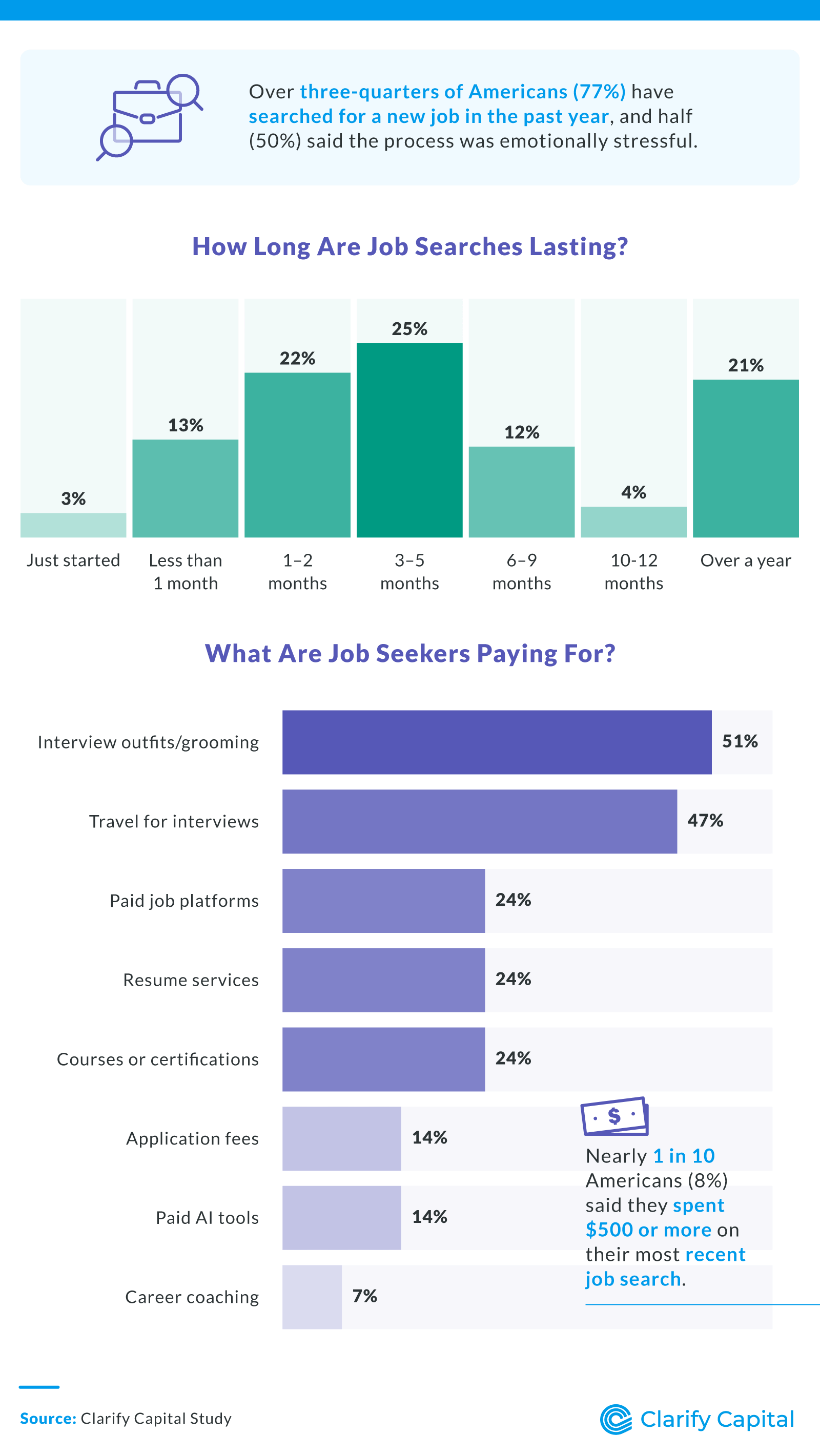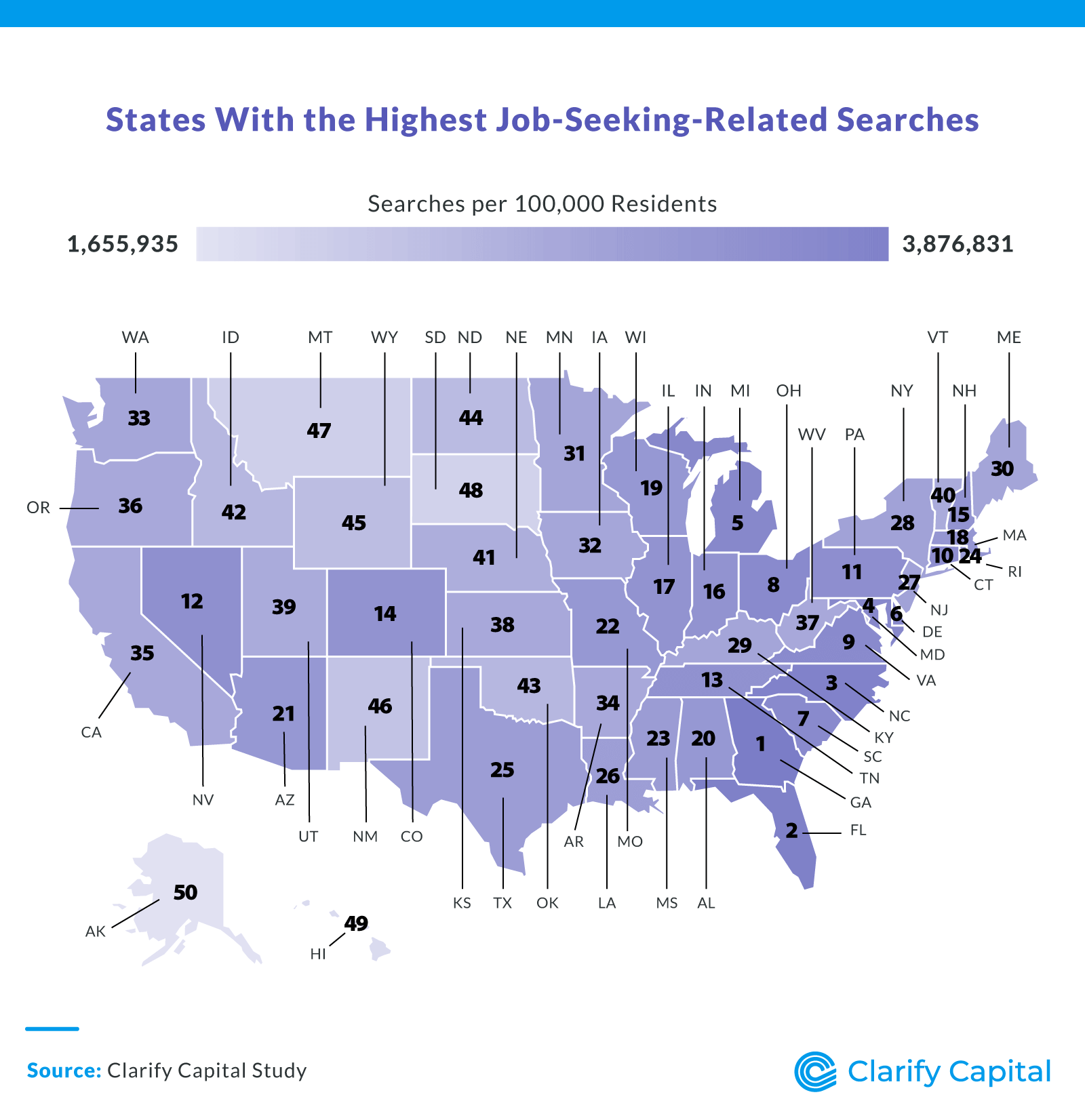Key Takeaways:
Over three-quarters of Americans (77%) have searched for a new job in the past year, and half say the process was emotionally stressful.
Nearly half of job seekers found work within 2 months, but 1 in 5 have been searching for over a year.
Gen Z leads all generations in job hunting: 86% have searched for a new job in the past year, and 60% say the process was emotionally stressful.
3 in 5 Americans have abandoned a job application because the process was too long, costly, or frustrating.
On average, Americans believe that 35% of job listings are "ghost jobs," positions posted even when companies aren't actively hiring.
Job Search Timelines and Costs
Job hunting can be time consuming and get expensive fast. As millions of Americans search for new roles, many are paying out of pocket while juggling a stressful and often lengthy search process.

More than 3 in 4 Americans (77%) said they've searched for a new job in the past year. Here's how that breaks down by generation:
Gen Z: 86%
Millennials: 77%
Gen X: 72%
Baby boomers: 60%
Some industries are also seeing higher rates of active job seekers:
Retail: 85%
Legal/Law: 83%
Construction/Skilled trades: 82%
Government/Public sector: 81%
Hospitality/Food service: 80%
And while some job searches move quickly, others drag on. Baby boomers were the most likely to job hunt for over a year (36%), followed by Gen X (26%), millennials (20%), and Gen Z (15%). Then there's the financial strain.
Americans most often shelled out money for interview outfits or grooming (51%) and travel (47%). Most (87%) had no savings set aside specifically for the job-hunting process. That left people covering costs out of pocket (31%), tapping into savings (14%), or putting expenses on credit cards (13%). Others skipped applying altogether due to cost (6%) or used "Buy Now, Pay Later" services (3%).
How Long Job Searches Are Lasting by Industry
Job search timelines vary significantly across industries. The table below shows how long job seekers typically spend looking for work, broken down by field:
| Industry | Just started | Less than 1 month | 1–2 months | 3–5 months | 6–9 months | Over a year |
|---|---|---|---|---|---|---|
| Arts / Entertainment / Media | 2% | 17% | 29% | 21% | 12% | 2% |
| Construction / Skilled trades | 0% | 21% | 14% | 18% | 11% | 29% |
| Education | 1% | 17% | 22% | 26% | 11% | 20% |
| Finance / Banking | 6% | 9% | 17% | 32% | 9% | 7% |
| Government / Public sector | 5% | 16% | 16% | 16% | 18% | 24% |
| Healthcare | 5% | 16% | 17% | 29% | 10% | 19% |
| Hospitality / Food service | 3% | 18% | 16% | 21% | 11% | 3% |
| Legal / Law | 0% | 8% | 25% | 25% | 0% | 42% |
| Manufacturing / Logistics | 2% | 10% | 22% | 27% | 13% | 24% |
| Marketing / Advertising | 0% | 13% | 27% | 27% | 7% | 29% |
| Retail | 3% | 17% | 25% | 18% | 13% | 18% |
| Technology / IT | 4% | 6% | 26% | 31% | 14% | 13% |
In legal professions, 42% of job seekers spent over a year looking (the longest of any industry in our study). Construction and marketing followed at 29% each. Job hunters in tech (13%) and finance (7%) saw faster results. The job hunt takes a mental toll, too. Half of all job seekers said the process was emotionally stressful. That jumps to 60% for Gen Z, while fewer millennials (49%), Gen Xers (46%), and boomers (40%) reported the same.
The Real-Time Investment Behind Every Application
Job hunting can feel like a full-time job, especially when the return on effort is low.

Unemployed Americans spend about 9 hours per week searching and applying for jobs. Those who are job hunting while still working average 5 hours per week. Gen Z was the most active generation overall. They submitted an average of 10 applications per search and spent 10 hours per week job hunting when unemployed or 6 hours per week while employed.
While 37% of job seekers heard back from employers within 1–2 weeks and 18% within a few days, nearly a quarter (22%) said they rarely heard back. Only 18% received and accepted a job offer in their last search, and nearly half (49%) got zero offers.
The process can be so tiring and frustrating that many Americans (60%) have simply given up because a job application took too long or cost too much. Even with long wait times and few replies, these strategies helped job seekers stay confident:
34% practiced on their own or used online resources.
28% leaned on encouragement from friends, family, or mentors.
20% said dressing the part boosted their confidence.
14% used AI tools like ChatGPT or resume checkers.
Where Job Searching Is Heating Up the Most
Job-hunting stress isn't evenly spread across the country. In some cities, search activity is surging, while others are seeing far less buzz.

We analyzed Google Trends data for 450+ job-search-related terms over the past year to find where interest is highest. The top searches included:
"How long does it take to get hired"
"Job search anxiety"
"Job hunting burnout"
These trends paint a clear picture. Many Americans are feeling uncertain, stressed, and eager for answers.
Top 10 Cities With the Highest Job Search Interest per Capita
Atlanta, GA
Miami, FL
Minneapolis, MN
Baltimore, MD
Tampa, FL
Las Vegas, NV
Denver, CO
Detroit, MI
Charlotte, NC
Memphis, TN
Bottom 10 Cities With the Lowest Job Search Interest per Capita
New York, NY
Oakland, CA
San Jose, CA
Bakersfield, CA
Wichita, KS
El Paso, TX
San Diego, CA
Los Angeles, CA
Fresno, CA
Tulsa, OK
Job Hunting Costs More Than You Think
The modern job hunt demands both time and money — two things that are often in short supply during unemployment. With most Americans lacking a budget for job hunting and many spending weeks or even months in the search process, it's no surprise that stress levels are high and application drop-off rates are common. Employers, job seekers, and policymakers alike can benefit from understanding these hidden burdens and finding ways to ease them in the future.
Methodology
We surveyed 1,000 Americans to reveal the hidden financial and time investments required for job seekers to land new roles in today's market. The average age was 39; 49% were female, 49% were male, and 2% were non-binary. Generationally, 6% were baby boomers, 20% were Gen X, 53% were millennials, and 21% were Gen Z.
We also analyzed Google Trends search volume data from January 2024 to April 2025 to determine which U.S. cities and states are experiencing the highest anxiety about job loss due to AI and automation. Our analysis included 466 job-hunting search terms. We tracked these trends across all 50 states and the 50 most populous cities.
To ensure reliability, only keywords showing a consistent upward trend during the study period were included. We then ranked the top trending searches per location using a per capita adjustment to spotlight significant deviations in search interest.
About Clarify Capital
Clarify Capital helps business owners secure the financing they need to thrive in today's competitive marketplace, including no-doc business loans and fast business loans. Our tailored financial solutions support entrepreneurial dreams, turning visions into reality.
Fair Use Statement
This article's insights may be shared for noncommercial purposes only. When referencing or sharing, please provide a link with proper attribution to Clarify Capital.

Michael Baynes
Co-founder, Clarify
Michael has over 15 years of experience in the business finance industry working directly with entrepreneurs. He co-founded Clarify Capital with the mission to cut through the noise in the finance industry by providing fast funding and clear answers. He holds dual degrees in Accounting and Finance from the Kelley School of Business at Indiana University. More about the Clarify team →
Related Posts





